Click on images to enlarge
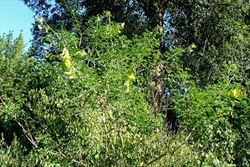
habit (Photo: Sheldon Navie)

habit (Photo: Sheldon Navie)
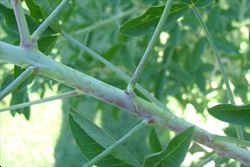
close-up of stems and leaf stalks (Photo: Sheldon Navie)
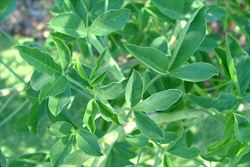
leaves (Photo: Sheldon Navie)
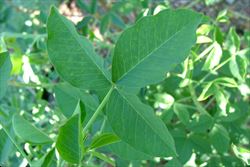
close-up of leaf with three leaflets (Photo: Sheldon Navie)
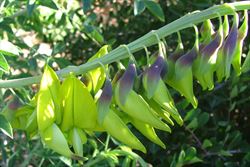
elongated flower cluster (Photo: Sheldon Navie)

close-up of flowers showing large sepals (Photo: Sheldon Navie)
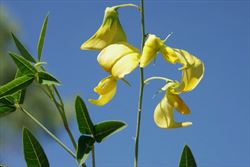
bird flower (Crotalaria laburnifolia), a very similar weedy plant with smaller sepals on its flowers (Photo: Chris Gardiner)
Scientific Name
Crotalaria agatiflora Schweinf.
Synonyms
Crotalaria agatiflora Schweinf. subsp. agatiflora
Family
Fabaceae (Queensland, the ACT, Victoria, Tasmania and the Northern Territory)Fabaceae: sub-family Faboideae (New South Wales)Leguminosae (South Australia)Papilionaceae (Western Australia)
Common Names
bird flower, bird-flower, canary bird bush, canarybird-bush, Queensland birdflower, rattlebox
Origin
Native to tropical eastern Africa (i.e. Kenya and northern Tanzania).
Naturalised Distribution
This species is naturalised near habitation in south-eastern Queensland, in the coastal districts of central New South Wales and in south-western Western Australia. It is also sparingly naturalised in eastern Victoria and naturalised on Norfolk Island.
Naturalised overseas in New Zealand and South America.
Notes
Canary bird bush (Crotalaria agatiflora ) is regarded as a minor environmental weed in Queensland, Western Australia and some parts of New South Wales (e.g. in the Gosford City region). For example, in south-western Western Australia it has occasionally escaped cultivation and invaded native grasslands and sandy sites.

